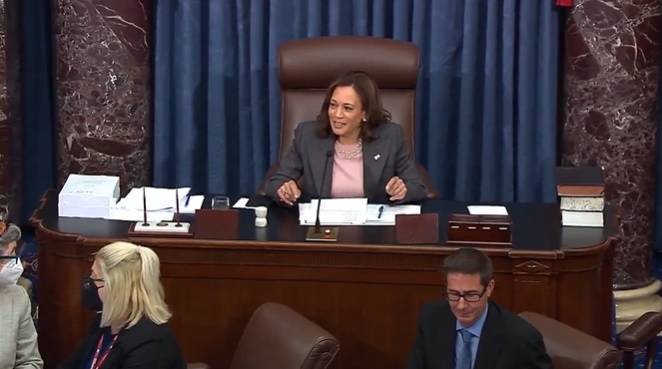Senate Passes Landmark Bill with Largest-Ever US Climate Investment

The U.S. Senate on Sunday passed the Inflation Reduction Act of 2022, with Vice President Kamala Harris providing the tiebreaking vote in the 51-50 decision. In addition to creating a 15% corporate minimum tax and provisions aimed at lowering the cost of prescription drugs, the bill allocates nearly $370 billion to climate and energy-focused investments and incentives.
Following the passage of the bill, President Biden issued a statement lauding “the largest investment ever in combatting the existential crisis of climate change.”
Biden added:
“It addresses the climate crisis and strengthens our energy security, creating jobs manufacturing solar panels, wind turbines, and electric vehicles in America with American workers. It lowers families’ energy costs by hundreds of dollars each year.”
Following a marathon session, the bill gained the support of all Senate Democrats, enabling its passage without major changes. The party’s ability to pass the legislation had been in question until a recent deal announced between and Democratic Senate Majority Leader Chuck Schumer and holdout US Senator Joe Manchin to include the climate provisions in the bill, although the compromise needed provided a requirement by the government to lease millions of acres of land and offshore locations for oil and gas development.
With the passage in the Senate, the bill will proceed to the House, where it seems likely to be approved.
Climate and energy focused aspects of the bill include measures to lower the cost of renewable energy solutions for consumers, promote the development of domestic clean energy manufacturing capacity, support climate solutions to decarbonize industry, and invest in climate resilience and mitigation initiatives in disadvantaged communities.
Key allocations include over $60 billion to accelerate domestic manufacturing of clean energy and transportation technologies through production and investment tax credits, loans and grants, $9 billion in consumer home energy rebate programs to electrify home appliances and for energy efficient retrofits, consumer tax credits or solutions such as rooftop solar, HVAC and heat pumps aimed at making homes energy efficient and run on clean energy, $30 billion in grant and loan programs for states and electric utilities to transition to clean energy, and a $27 billion clean energy technology accelerator to support deployment of technologies to reduce emissions.
The package also includes over $60 billion for “environmentalEnvironmental criteria consider how a company performs as a steward of nature. More justice priorities,” aimed at driving investments into disadvantaged communities. Additionally, the bill targets billions in climate solutions-focused investments targeting farmers and forestland owners, including over $20 billion for climate-smart agriculture practices, in addition to tax credits to support biofuels production and to develop sustainable aviation fuel infrastructure.
Sustainability-focused organizations and business coalitions broadly applauded the Senate’s passage of the bill. Zach Friedman, Director of Federal Policy at sustainability non-profit Ceres said:
“American businesses and investors have championed the clean energy measures in this deal for more than a year because they recognize that these investments are critical to building the innovative industries, domestic supply chains, and advanced manufacturing capabilities our economy needs to compete now and in the coming decades. They will also help lower energy costs, reduce the climate-related risks that threaten the economy, and create millions of quality jobs in rural, disadvantaged, and energy communities.”
Jennifer Morris, CEO of global conservation organization The Nature Conservancy said that the Senate’s approval provides “more optimism than we’ve had in years, that the U.S. Congress recognizes the urgency of the global climate crisis and is prepared to lead a meaningful response.”
Morris added:
“Reducing carbon emissions by roughly 40% by 2030 will put us within reach of our climate goals and international commitments. Equally important, the bill will begin to address the disproportionate effects air pollution and climate change have on historically marginalized or underserved communities.”
The post Senate Passes Landmark Bill with Largest-Ever US Climate Investment appeared first on ESG Today.